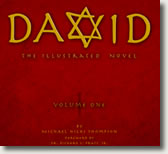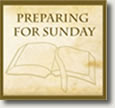Faithfulness and Frailty
 One of the young men answered, “I have seen a son of Jesse the Bethlehemite who is skillful in playing, a man of valor, a warrior, prudent in speech, and a man of good presence; and the Lord is with him.”
One of the young men answered, “I have seen a son of Jesse the Bethlehemite who is skillful in playing, a man of valor, a warrior, prudent in speech, and a man of good presence; and the Lord is with him.”
—1 Samuel 16:18
According to David's description, he lacks for nothing. This shepherd boy and youngest son of Jesse is prudent, courageous, a skillful musician and "a man of good presence." As his story unfolds, we also discover that he is the composer of psalms, a faithful friend to Jonathan, and a valiant and honorable fighter who slays lions, bears and the giant Goliath. But David is also the doer of cruel and selfish acts—immoral deeds meant to serve his own purposes and hide his indiscretions. He, like all of us, has many sides, some admirable and virtuous, others marred by deviousness and deception. Yet, from the beginning we know he is favored— "the Lord is with him," and God chooses David for kingship.
Rabbi Micah Greenstein speaks of David this way:
David’s image in Judaism is many-faceted. David has been exalted by the early rabbis as everything from a scholar and poet to Israel’s warrior King. In Jewish liturgy, David is the “sweet singer of Israel” and founder of the dynasty which according to Jewish tradition is eternal. What makes David typical of the characters in the Jewish Bible is his frailty. Moses had a speech impediment, Abraham almost failed God’s test with Isaac, and beloved Rebekah favors one child over another. Whether looking at David through the prism of his three principal wives—Michael, Bathsheba, and Abigail—or his excessive and exuberant killing of an extra hundred Phillistines beyond Goliath, David is the prototype of Jewish biblical action heroes. Jewish superheroes are neither perfect nor immaculate—our biblical figures are superhuman. The story of David in the Hebrew Bible was not the first time, nor would it be the last time, that God would use human frailty for divine purposes.
David also reminds us of the fine line between charisma and magnetism and violence and destruction. All four seem to swirl around David BEFORE Bathsheba even enters the picture.
In David’s story, we learn about strength and frailty, honor and double-dealing, humility and arrogance, all in one man. And perhaps we also learn something about our ever-surprising, redeeming and loving God, whose movement toward justice and goodness is constant, yet takes forms we never expect.
That is what the life of faith is about. We offer ourselves to God, for the glory of God. And we fall down and we get up.
—John B. Fritschner
excerpted from How can I live a life of faith?
[F]or it is God who works in you to will and to act according to his good purpose.
—Philippians 2:13 NIV
Very possibly God's love is even greater for us at the point where we do fail to follow God's Word and way. God's love for me, for each and all of us, is not based on my or our performance (Thanks be to God), but on the revealed nature of the heart of God. Another way of saying this is in a one-liner I often use: "God does not love me because I am good, but because God is good."
—Douglass Bailey
excerpted from the question How can God love us when we consistently fail to follow God's word?
Man is born broken. He lives by mending. The grace of God is glue. —Eugene O'Neill
So do not fear, for I am with you; do not be dismayed, for I am your God. I will strengthen you and help you; I will uphold you with my righteous right hand. —Isaiah 41:10
The will of the Father is pretty much spelled out in The Sermon on the Mount: strive for justice among all people, treat others as you want to be treated, and when you pray say, ‘thy will be done.’ That, as we know, is a huge order in itself. And it is enough.
—Margaret Jones
excerpted from Good Enough
If the Almighty directs our steps, we've no need to look back over our shoulders.
— Liz Curtis Higgs
Here Burns My Candle
The commitment of Christ is always to see what our possibility is. He never looked at an individual that he didn’t see potential there, because he knew that through God’s grace that person could become less of what they had been and more of what God would have them be.
—Brooks Ramsey
excerpted from Beyond Nothing But to More Than
I sought to hear the voice of God and climbed the topmost steeple, but God declared: "Go down again - I dwell among the people." — John Henry Newman
Personally and collectively, the human journey is not about being perfect but about being perfected, to the extent that we give ourselves to those hard-won lessons and begin to cooperate with the good God seems to be bringing out of them.
—Katherine Lehman
excerpted from Does God make mistakes?
God doesn't require us to succeed, he only requires that you try. — Mother Teresa
Forget your perfect offering. There is a crack in everything. That's how the light gets in.
—Leonard Cohen
Anthem
The release of the Holy Spirit is unexpected—there is always a quality of surprise about the movement of the Holy Spirit in our lives. It is not something you can prepare for, or even look forward to, though you can be on the lookout for it. It is ever new—ever fresh—without the taint of weariness and repetition. It may call you to do something you would never have thought to do on your own.
—Renee Miller
excerpted from How to Recognize the Holy Spirit in Your Life
"With God, all things are possible." — Matthew 19:26 NIV
"...Grace is for everybody...but mercy is for those of us on the inside of grace who still mess up..."
—Johnny Ray Youngblood
excerpted from We Are Forgiven
[The Christian] does not think God will love us because we are good, but that God will make us good because He loves us.
— C.S. Lewis
Define yourself radically as one beloved by God. This is the true self. Every other identity is illusion.
— Brennan Manning
Abba's Child: The Cry of the Heart for Intimate Belonging



